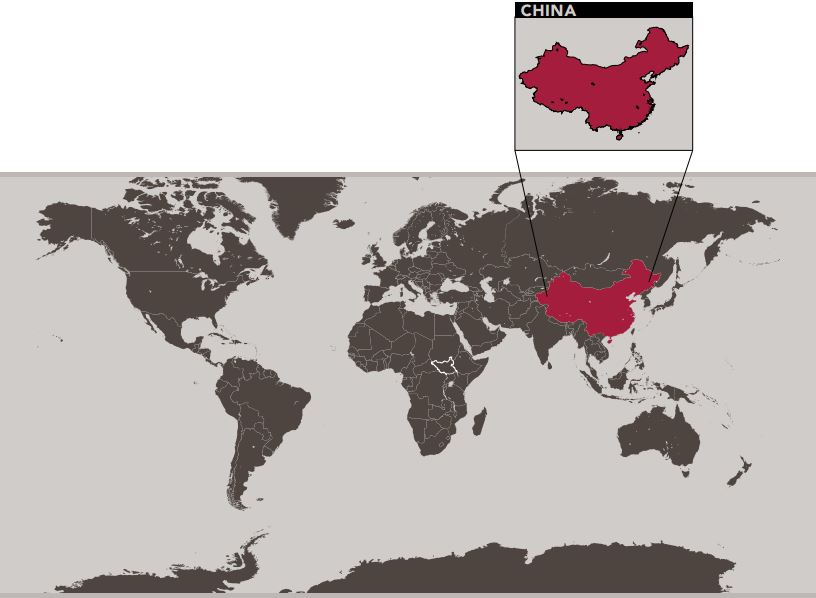
USCIRF China Chapter – 2016 Annual Report
Key Findings
China’s severe religious freedom violations continued in 2015. While the Chinese government sought to further assert itself on the global stage, at home it pursued policies to diminish the voices of individuals and organizations advocating for human rights and genuine rule of law. During the past year, as in recent years, the central and/or provincial governments continued to forcibly remove crosses and bulldoze churches; implement a discriminatory and at times violent crackdown on Uighur Muslims and Tibetan Buddhists and their rights; and harass, imprison, or otherwise detain Falun Gong practitioners, human rights defenders, and others. Based on the continuation of this long-standing trend of religious freedom violations, USCIRF again recommends in 2016 that China be designated a “country of particular concern,” or CPC, for its systematic, egregious, and ongoing abuses. The State Department has designated China as a CPC since 1999, most recently in July 2014.
Background
The past year was marked by the Chinese government’s deliberate and unrelenting crackdown on human rights and dissent. This crackdown transpired while the government considered new laws to bolster its power and reach, such as a national security law enacted July 1 and a terrorism law adopted on December 28. China’s leadership has long justified its harsh policies, including against Uighur Muslims, Tibetan Buddhists, and others, by asserting the importance of confronting the so-called “three evils” – separatism, terrorism, and religious extremism. In 2015, the Chinese Communist Party tightened its internal ideology, elevating the crusade against the three evils, particularly with respect to religious freedom.
During the past year, the government increased its targeting of human rights lawyers and dissidents, some of whom advocated for religious freedom or represented individuals of various beliefs. In July, authorities across China undertook a sweeping dragnet rounding up lawyers and human rights defenders, including religious freedom advocates, with nearly 300 arrested, detained, or disappeared. Many of these individuals came under government suspicion precisely because they chose to represent politically-undesirable religious groups, such as Uighur Muslims, unregistered Christian leaders and members, and Falun Gong practitioners. While most were released, the location of a few individuals remains unknown and additional detentions and arrests continue. Among those criminally detained or facing charges of subversion or endangering state security are Wang Yu, Li Heping, and Zhang Kai, human rights lawyers known for defending Falun Gong practitioners, Christians, and others. China also punished individuals exercising their right to free speech, such as human rights lawyer Pu Zhiqiang, who in December was handed a three year suspended sentence for “picking quarrels” and “inciting ethnic hatred” in a series of social messages critical of the government’s policies.
Those following one of China’s five officially recognized religions – Buddhism, Taoism, Islam, Catholicism, and Protestantism – and affiliated with one of the corresponding state-sanctioned “patriotic religious associations” are protected in theory from the government’s crackdown on religion. However, the continued imprisonment of Pastor Zhang Shaojie of the state-registered Nanle County Christian Church demonstrates that state recognition is no guarantee of protection. The government continued to accuse individuals and religious organizations of engaging in so-called “cult” activities. Underground house churches are particularly vulnerable to these accusations; Buddhist leader Wu Zeheng received a life sentence in October for his alleged involvement in a cult.
The Chinese Communist Party officially is atheist and took steps in 2015 to ensure that Party members CHINA reject religion or belief. More than half of China’s population is unaffiliated with any religion or belief. There are nearly 300 million Chinese who practice some form of folk religion; more than 246 million Buddhists; at least 68 million Christians; nearly 25 million Muslims; and less than 3.6 million apiece practice Hinduism, Judaism, or Taoism.
…
Falun Gong
In 2015, thousands of Falun Gong practitioners reportedly were arrested or sent to brainwashing centers or other detention facilities. Brainwashing centers are a form of extralegal detention known to involve acts of torture. Based on statements from Chinese health officials, the long-standing practice of harvesting organs from prisoners was to end on January 1, 2015. However, many human rights advocates believe the practice continues. Imprisoned Falun Gong practitioners are particularly targeted for organ harvesting. Li Chang, a former government official sentenced to prison for his involvement in a peaceful Falun Gong demonstration, is among the countless Falun Gong practitioners who remain imprisoned at the end of the reporting period. The Chinese government continued to deny Wang Zhiwen a passport or the ability to travel freely to receive proper medical care following the torture he endured during his 15 years in prison. Chinese authorities denied a visa and barred entry into mainland China to Anastasia Lin, a human rights advocate and Falun Gong practitioner. As Miss World Canada 2015, Ms. Lin was scheduled to participate in the Miss World event held in China in December 2015.
The entire report is available below:
